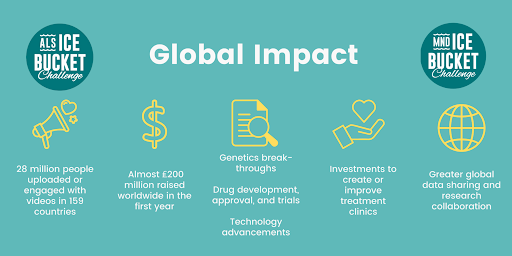Remember the Ice Bucket Challenge? Well, who doesn’t?
Healthcare is a noble profession. In a digitalized world where information is overflowing, healthcare professionals and providers must divert the attention of the masses to what really matters. And the Ice Bucket Challenged managed to do just that!
The simple, yet bold campaign called for people to dump ice and water over individuals’ heads to create awareness and encourage donations for Amyotrophic Lateral Sclerosis (ALS) research. The 2014 ALS Ice Bucket Challenge drew the attention of 17 million people worldwide. 2.5 million people in the US alone, donated over $115 million to the ALS Association and ALS research funding increased by 187% worldwide, supporting more than 500 projects (Source: The ALS Association). The campaign also saw responses from Bill Gates and George W Bush.

Source: International Alliance of ALS/MND Associations
Not only did the challenge create awareness about ALS (the cause), but it also helped The ALS Association (the brand) achieve its goal of fundraising.
This essentially sums up the complete essence of Cause-based Marketing (CBM). In technical terms, cause-based marketing is a strategic initiative by healthcare providers such as doctors, hospitals, clinics, brands and stakeholders to align with and support relevant social (here, health) causes. CBM leverages your brand’s influence, resources and social presence to raise awareness, support or funds for health causes.
The intertwining of your brand and the cause it resonates with creates a positive social impact while driving community engagement and building brand loyalty among the stakeholders such as patients, employees and communities. CBM differentiates your brand from your competitors while positioning it as a pioneer in health causes such as health and preventive awareness, healthcare access and affordability, medical research, fundraising, or patient advocacy. This not only boosts your brand’s reputation but also enhances the stakeholders’ and patients’ perception of your brand. The CBM approach also aligns your brand mission and values with the social health causes, drives awareness and demonstrates your brand’s commitment to social responsibility and ethical business practices.
The 10 principles of a cause-based campaign that can drive meaningful impact
Healthcare marketing, in any form, provides a distinctive landscape of complexities and considerations, unlike traditional and retail brands. Healthcare brands must create a perfect balance between the promotional and educative value in all their marketing agendas, while they address the needs of all stakeholders involved. Every brand and every audience resonate with a different set of causes; to create a campaign that aligns with your core brand values and strikes a chord with your intended audience, it is important to adhere to ‘ethical principles’. By recognizing and embracing these “commandments of cause-based marketing”, your brand can uphold integrity, transparency and social responsibility while promoting its initiatives.
We all know the Bollywood actress, Deepika Padukone, and her struggle with depression. We also know about a hundred other stories through the #NotAshamed campaign launched by her foundation- Live Love Laugh in 2018. The campaign encouraged real-life survivors to speak about their mental health journey and seek help. Through first-person narrative stories and videos of over 50 depression and mental illness survivors, the campaign reached 80 million people over different social media platforms.
How did the campaign hit all the right notes?
- By focusing on the noble cause : The campaign focused on the underlying (noble) emotions of assurance and hope that people battling mental illness need, to spread awareness.
- By doing what THEY do best : The campaign focused only on overcoming mental health issues such as specifically depression, anxiety and stress- a health cause that is relevant to their brand and organization.
- By highlighting the cause over their brand : When your cause resonates with the right audience, it will automatically direct them to your brand. Overshadowing your cause with your brand promotions can add a negative tint of publicity to both- the cause and the brand.
- By making the right investments: Simply allocating a marketing budget or being the sole torchbearer of your cause will not get you the desired impact. #NotAshamed identified real-life survivors and highlighted their stories to amplify their underlying motto- to openly ask for help.
- By building trust and responsibility: The platform provided a safe space free of judgement and full of assurance for their audience to open up and speak freely about their struggles. With Deepika Padukone sharing her mental health struggles first, the campaign leveraged her social impact to create a sense of trust and empathy.
- By sticking to their niche: Every person fights their own mental health battles over time. The campaign stuck to its niche of highlighting stories that resonated with its brand mission- depression, anxiety and stress, issues that the foundation focuses on primarily.
- By collaborating with the right people: Would any other celebrity or actor have created the right engagement for the campaign? No. Deepika Padukone has been open about her depression struggles since 2014. The audience resonated with her story as their own, which helped create the engagement that the cause asked for.
- By being consistent over the years: The foundation has created several campaigns over the years that have focused on varied aspects of depression. Being authentic, consistent and helpful, builds credibility and deepens your brand’s image in your audiences’ minds.
- By staying true to their cause: #NotAshamed was not a PR stunt. The campaign was a genuine effort to create awareness and let people know they are not alone, and it showed!
- By creating a system that works for them: Finding their survivor stories in a population of 1.37 billion could not have worked if not for their system. By creating a safe space and assurance, the system motivated people around the country to open up their struggles and talk more freely.
The 7-step action plan that led to over 17 million impressions
Lemons can make or break the taste of any delicacy. But who would have thought that one day they would become a symbol of breast cancer awareness? The Know Your Lemons Foundation created the #knowyourlemons campaign to aid in the early detection of breast cancer through symptoms and self-screening through a single image of 12 rotten lemons. The campaign has so far helped women across 90 countries in 34+ languages, educated over 1,10,000 people in person trained 900+ volunteer educators and created an impression of 1.85 billion!

A cause this big, and an even bigger campaign. The success could not have been a fluke!
To create a cause-based campaign that reaches the masses, it is important to ensure that you have set clearly defined and measurable goals that can give you a measured outcome. Every cause-based campaign essentially follows a simple 7-step action plan that can ensure an impactful campaign that can foster a positive change and uphold your brand’s commitment to social responsibility and ethical practices.
The action plan is a strategic blueprint that can drive effectiveness in any cause-based campaign. If we closely look at the “Know Your Lemons” initiative, it exemplifies the steps of an impactful campaign:
- The campaign chooses a cause that is meaningful to the stakeholders: driving awareness towards breast cancer detection and screening.
- The campaign meticulously planned its target audience to include women of all ages and backgrounds, with a focus on those at risk or affected by breast cancer.
- A comprehensive marketing calendar with content ideation and creation, social media campaigns, community outreach events, and partnerships with healthcare organizations, adds value to your campaign by making it more streamlined.
- The “Know Your Lemons” campaign was launched to educate and empower women to conduct breast self-examinations and seek timely medical care.
- The campaign utilized various marketing mediums, including social media platforms, websites, print materials, community events, and partnerships with influencers, to spread awareness about breast cancer detection and the campaign’s message. This resulted in over 500,000 shares and 17 million views of the campaign infographic.
- The effectiveness of the campaign was measured through website analytics, social media metrics, reach, engagement, and behaviour change among the target audience. The metrics revealed a 30% increase in self-examination rates among women, a 25% increase in breast cancer awareness and a 15% rise in mammogram screenings among the campaign’s target audience
- The post-campaign report of Know Your Lemons can be found on their campaign website: knowyourlemons.org
Cause-based marketing in healthcare is not just about numbers or metrics; it’s about forging deep, lasting connections with people on a personal level. By touching hearts and inspiring action, healthcare brands have the power to leave a profound impact on individuals and communities alike. It’s a responsibility, but also a privilege, to serve as a beacon of hope and compassion in a world that often looks to healthcare professionals as saviours. So, let us embrace this responsibility and strive to make a meaningful difference in the lives of others. In doing so, we not only fulfil our purpose but also leave behind a legacy that will be remembered and cherished for generations to come.
About the Author:
Mohammed Ilias,
Founder & Brand Strategist,
BCC Healthcare
Mohammed Ilias is an International Healthcare Branding and Marketing Strategist and an Ethical Marketer successfully running BCC Healthcare – an integrated healthcare branding and marketing agency with a team size of 60 and a portfolio of 400+ healthcare clients. He is the author of Amazon Bestseller Ethical Hospital Branding & Marketing : 15 Proven Strategies. He has trained 5000+ Doctors on various ethical marketing practices through his workshops and talks. He advises Hospitals, Doctors, Pharma Companies, Labs, Health Tech Brands, Healthcare Expos Medical Equipment Manufacturers & other healthcare setups on the ethical ways of brand building.

